#diploma
Text
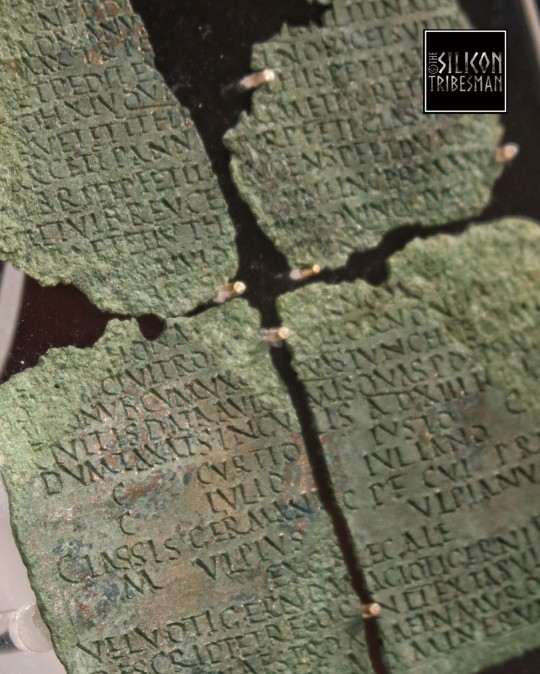
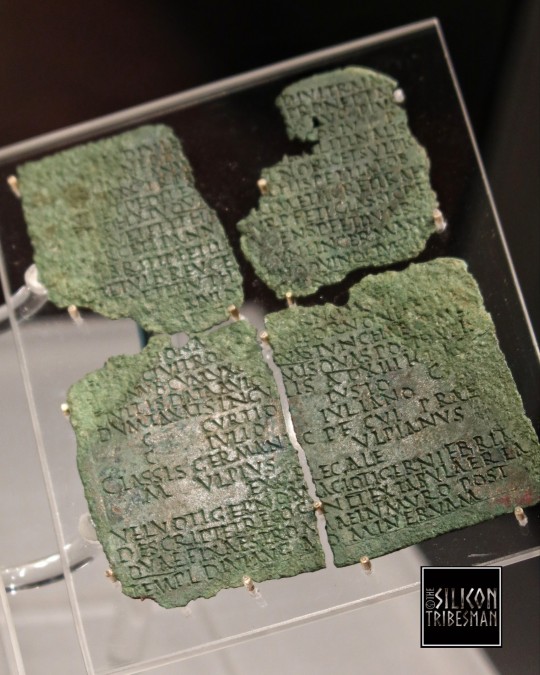
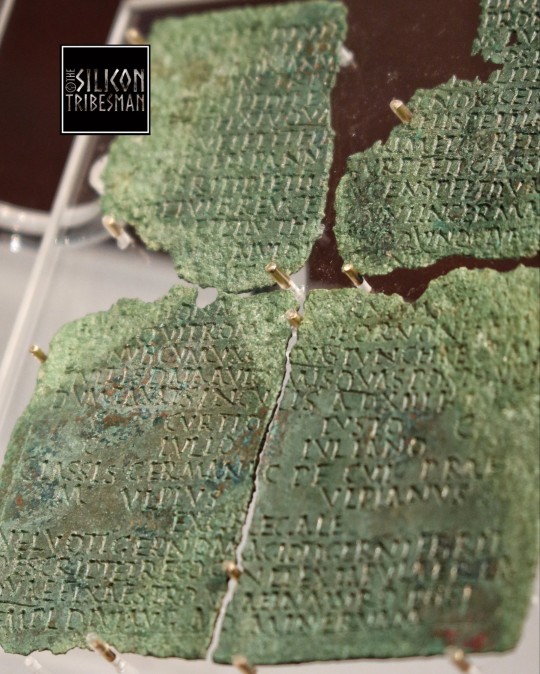
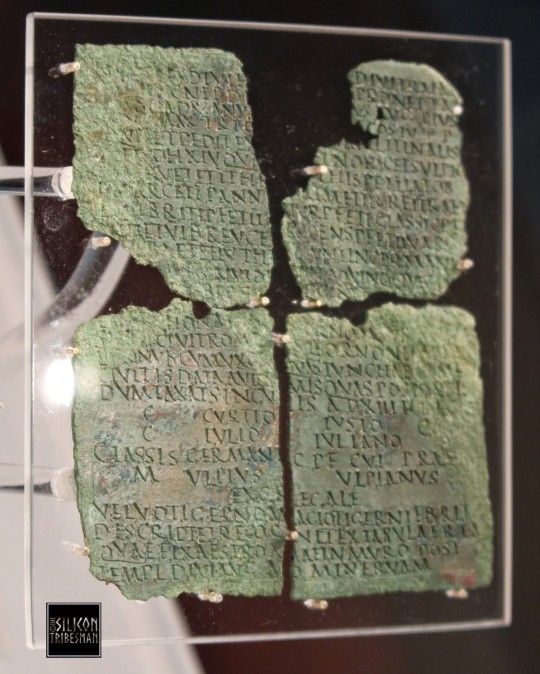
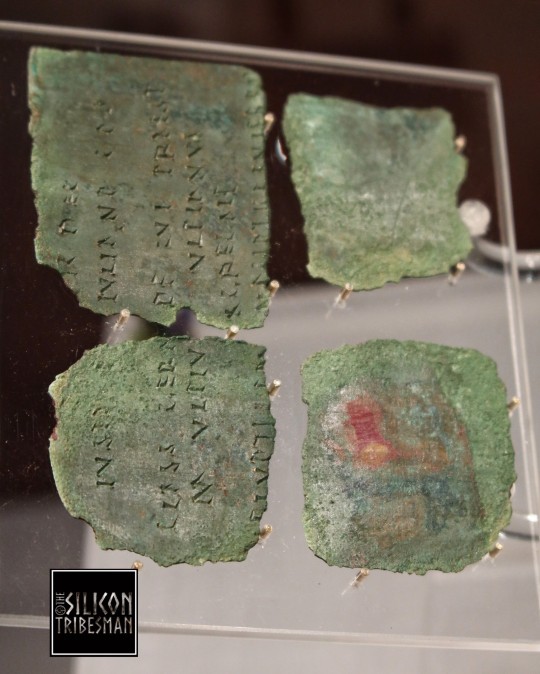
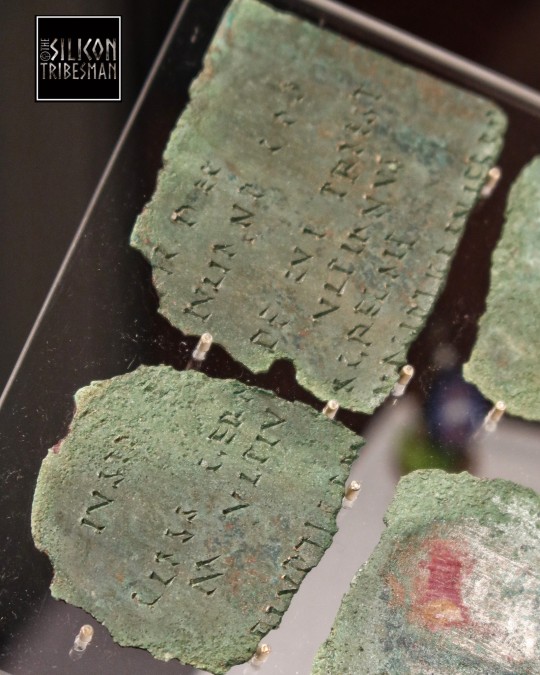
The Lanchester Roman Diploma
Found by a metal detectorist near Lanchester, Co. Durham, this is the first complete Roman Fleet Diploma to be discovered in the country and reveals the identity of one of Britain's first named sailors.
In the Roman Empire, there were citizens and non-citizens. Being a citizen gave you social and legal advantages. These included the right to own property, not pay some taxes and the right to have a lawful marriage. Most people in Britain at this time were not citizens. One way to become a citizen was to serve in the Roman army for 25 years, or the navy for 26 years. A diploma was the document that proved you had completed military service and could call yourself a Roman citizen.
The Lanchester Diploma was issued by the emperor Antoninus Pius (138-161 CE) to Veluotigernus, a Briton from Lanchester, County Durham, in around 150 CE. To earn his diploma, Veluotigernus had served in Classis Germanica, the Roman navy in Germany. We know his unit was based around Cologne, and that their main duties at this time were patrolling and logistics rather than combat.
It is unusual to be able to identify a local person from this period by name. Veluotigernus' British name ended with '-tigernus', which means 'king or 'master' This suggests that Veluotigernus was from a high-status local family. When he was honourably discharged from the navy, his name, according to the diploma became Titus Aelius Veluotigernus - illustrating that he, like many others, had embraced Roman culture. He is the second oldest known sailor in the country, and one of the few Britons we know to have served in the German fleet.
The diploma is made of a copper alloy. It consisted of two inscribed rectangular bronze plates,like pages in a book. The inside pages contained the complete text, whilst the outside had a shortened version, along with a list of seven witnesses. Each diploma was checked and then sealed to create a single document. It is very unusual to find a complete diploma.
Most diplomas were broken up, and the pieces passed to the recipient's children, allowing each of them to claim Roman citizenship. It is unclear what prompted Veluotigernus to bury the diploma rather than distributing the pieces amongst his close family.
The Museum of Archaeology, Durham University
#roman#diploma#roman fleet#sailor#lanchester diploma#archaeology#relic#artefact#text#metalwork#service#roman army#roman sailor#roman empire#romans
196 notes
·
View notes
Text
22 notes
·
View notes
Text
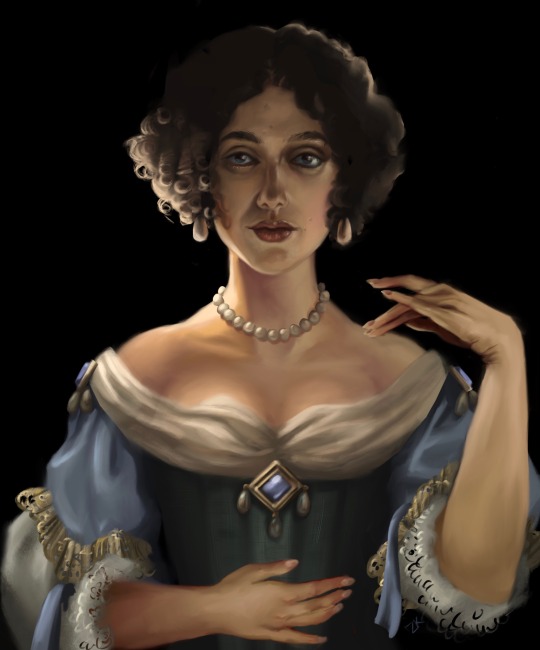

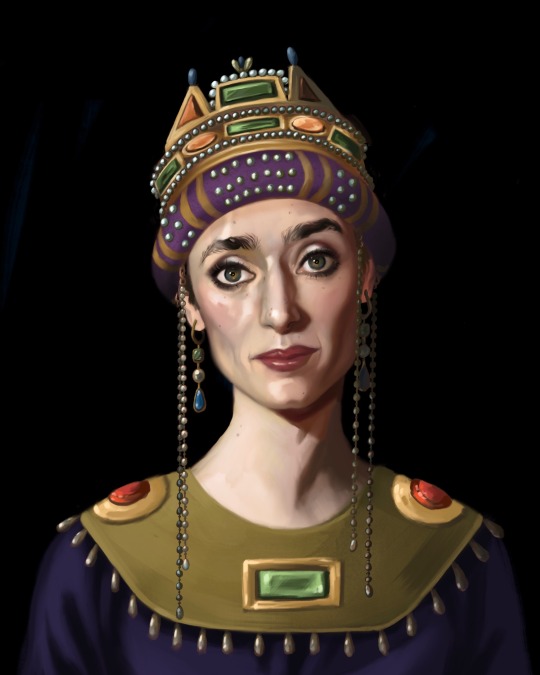

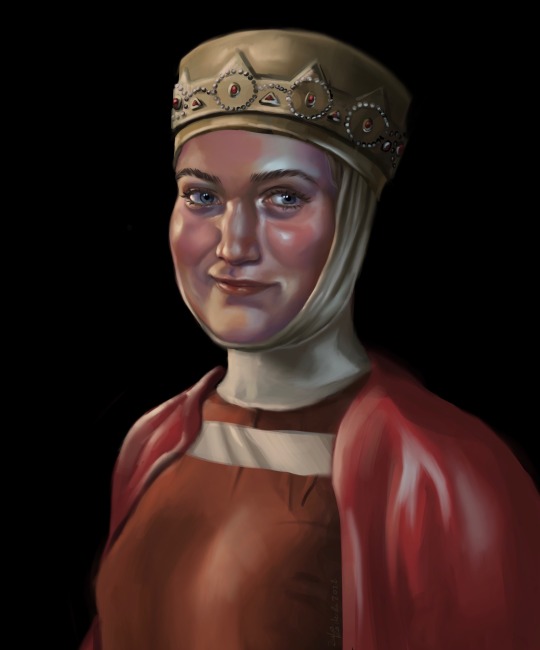
I think I’ll make more of them. These were all in my diploma about women in history.
1. Marie Casimire Louise de La Grange d'Arquien
2. Livia Drusilla/Iulia Augusta
3. Empress Theodora
4. Queen Tiye
5. Regelinda
(I’ll probably make a post about every one of them but yeah)
#the drawings are from 2022 so quite old#i’d draw them differently now#women in history#historical women#diploma#my art#empress theodora#theodora#regelinda#regelindis#livia drusilla#iulia augusta#marie casimire#maria kazimiera
101 notes
·
View notes
Text
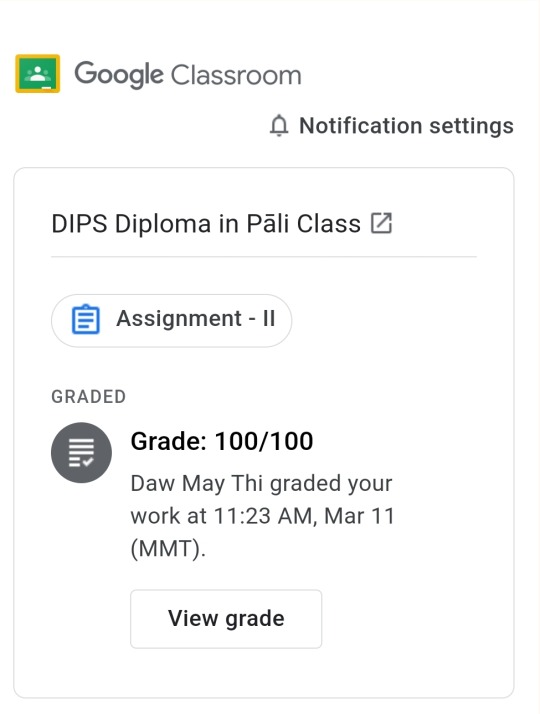
Everytime I get good grades, I'm like "wait the mfs from high school weren't kidding about academic validation" lmao
#studyblr#langblr#100 days of productivity#pali#pali langblr#pali language#pali diploma#diploma#language learning#studyspo
31 notes
·
View notes
Text
Throughout my university education, I tried incessantly to be a good student and I took pleasure in inflating my marks. Despite being one of the few students not having studied pure maths at A-Level, I almost exclusively achieved firsts (only once achieving a 2:1 in French, which I then improved the following year) and finished my undergraduate degree in Maths with awards for my high grades and requests from my teacher to continue my studies for the sake of science. Now that the memory of Bristol is becoming more and more distant, I want to tell you, reader, how I did that.
Imposter syndrome
Before you’ve even started studying, imposter syndrome might set in. Don’t let the doubts about whether you deserve to be in your institution block your path. I remember thinking that everyone else had studied further maths; that maths was what the other students dedicated their lives to (while I just liked it enough); that my occasional lack of comprehension was proof that I got into this university on a whim and I was not as worthy as the other students. To those thoughts, I invite you to reply “Let’s see how far I can go with this.” If you really did get into an amazing university with students who are supposedly superior to you then let’s see how much you can take from this university: how many classes and mentally stimulating problem sheets, how many afternoons in your cherished campus until they realise that you’re not supposed to be there. Try your damndest to keep up and maybe you’ll surprise yourself and find that that drive is exactly what is going to keep you where you where you want to be. If you’re not supposed to be there: cash in.
Alternatively, maybe you got into a university which you think you’re too good for. Prove it. If you’re too good for this uni, then get a first and have them begging you to do a PHD. I dare you.
Come back to it later
When starting university, you need to build skills as well as learn content. You know how to memorise the notions and how to apply the formulae – you’ve been using this kind of skill since GCSE – but building analytical skills or learning to write elegant proofs cannot be done in an evening or with a pack of flash cards. When learning to write proofs, I recommend to you to write out the teacher’s proofs and annotate the relevance or each sentence. I also used to break down big proofs into the function of each paragraph and then imitate it afterwards. You could also use this approach for applied maths: note the techniques used at each stage of a response at the side of the page and then try to do it yourself. Remember, though, that you a building a skill and this will take effort and repetition. If you’re not quite getting it on Tuesday, give it a good go (at least 20 minutes of actively trying to understand a method or a style) and then come back on Wednesday. You might not be used to having to leave something unfinished for the evening but Rome was not built in a day and your first year is essential for building a good foundation so use your time generously for your study.
PS. A small proof tip I have is to define any theorems you’re going to use in your introduction and then you won’t forget how you were planning to tackle the problem and you won’t need to define them later, which will improve your flow.
Previewing Content
I didn’t consistently read the lecture notes before class started but when I did I felt rather proud of myself. I knew what was coming up in the lesson and therefore like I had an advantage over other students and if something didn’t click when I was reading, sometimes simply the teacher’s intonation would clarify all of it. A quick glance over the content (not necessarily absorbing any of it) is all it takes to feel smug and curious before the lesson even begins.
Conversely, consolidating content.
If you didn’t understand the lesson, the best thing you can do is actively review the lecture notes. Explain them aloud or write them out in a conversational tone as if you were explaining it to yourself. In maths in particular, this can render the abstract more intuitive and allow you to manipulate concepts more easily. Throw in an example or two if need be, to concretise your understanding.
Also, find some chums to discuss with after class. Even if you just complain about a homework problem, chatting with a friend can make topics more memorable. Don’t be shy about not getting something: your friend may rephrase the content and turn out to be a better teacher than the initial lecturer. So complain, rant, explain, or just make jokes about the lesson, and this might contribute to the community in your course simultaneously.
Taking this further, be present and helpful on your course group chat around exam season! You’ll find that other people may pose questions which highlight a gap in your knowledge or that explaining to another solidifies your own comprehension.
Even after your course ends, it could be nice to honour what you have learned using books and documentaries. I read Alex’s Adventures In Numberland after my maths degree just for the nostalgia and I ended up adding some niche trivia to my expensive education. Your knowledge should inspire you and stimulate you, not stress you out.
Be a teachers’ pet: you paid for it.
In first year, I frequented teachers’ office hours and I’m glad I did because receiving maths through verbal and illustrative demonstration helps me to surpass the abstract words on the page. If you have a quick query, don’t be afraid to send an email or chat with the teacher after the lesson. Put up your hand to ask or answer questions - sitting at the front might make this less scary since you can’t see all of the other students. These teachers are experts in their field so interact with them and enjoy their thought-provoking conversation – use it to nourish your own curiosity and to motivate yourself to make them proud. Many a time, teachers sent me extra articles or books after I had expressed a curiosity or lack of understanding to them and thus I have resources to further my study despite having graduated.
Better than knowing the content, know the teacher’s style.
I noticed when doing functional analysis past papers that there was always a question requiring a certain technique following a question requiring another technique: this knowledge was indispensable in the final exam! I almost wasted time trying the wrong technique until I remembered this and then recited a perfect answer, of which previous exam papers had assured me the correctness. Knowing the teacher’s style can give you a hint about the content of the exam (where to focus your revision) and helpful insight about strategies required. As well as this, they’re a booklet of fun problems which are tailored to your competences – what’s not to love?
Concluding advice…
The above advice is applicable only when you already have a study schedule and you do what is required to you to keep up with assignments and content, but how you do this depends on your learning style, your waking hours, your extra-curricular activities, etc. I can’t give you a study plan but I can give you the above flourishes to make a good routine even more effective and I can leave you with some final advice: don’t lie to yourself. Don’t tell yourself that something is good enough when you don’t think it will get you what you want. Sometimes you just don’t get things and you may need to take a jog or go to the bathroom to think about it with a clear mind or sometimes you don’t have the time to waste on a single problem when other assignments are urgent – that’s okay, but give yourself the best chance of getting it right by beginning it early and prioritising your study first and foremost. Don’t hope for a grade, work for it: effort is much more dependable than chance.
#that girl#studyblr#study blog#study motivation#university student#mathematics#math studyblr#mathblr#math#math blog#bachelors degree#diploma#advice#study advice#clean girl
62 notes
·
View notes
Text

Maldita titulitis.
45 notes
·
View notes
Photo

Source details and larger version.
Here's my gallery of unusual imagery from vintage college yearbooks.
20 notes
·
View notes
Text

TIL my bachelor's diploma is going to have a little overview of our educational system. so people don't get confused with it :)
#textpost#studyblr#today i learned#uni#diploma#i'm now very doxable#you can probably figure out which uni i go to :)
57 notes
·
View notes
Text
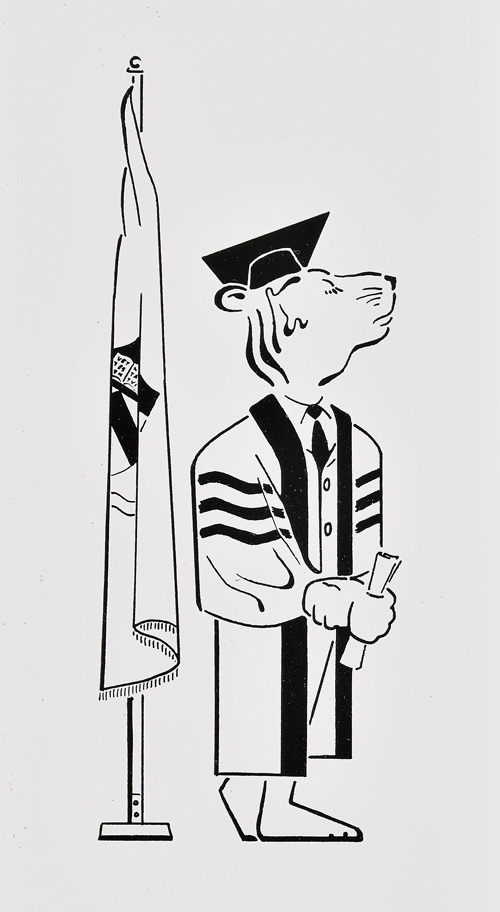
Tiger Tuesday: This dignified, scholarly tiger stands next to the Princeton University flag in the 1958 Bric-a-Brac.
The entire Tiger Tuesday series
12 notes
·
View notes
Text


Rare Photos of Jim Henson receiving his Honorary Doctorate from his Alumni at the Class of 78 commencement at the University of Maryland. Photo courtesy of University of Maryland University Archives Page.
12 notes
·
View notes
Text
I know we all think of the whole 'Buck as a teacher ' as a parallel to Ana Beeing a teacher. But it got me wondering. You need a degree to become a teacher, to get a degree you need some kind of higher education. It's not easy to become a teacher (I would know, I'm currently trying and failing to become a teacher). In Buck begins we find out that he went to college. He went to, and got kicked out of community college before he got his degree, his diploma.
What was Buck getting a degree in??? I really want to know. We know a lot about Evan and what he was like as a kid and a teen and a 20-something pre LAFD. But what did Evan aspire to be. What was the plan for EVAN. We know that he felt that if he stayed in Hershey for one more day he would've suffocated, so what was his OG escape plan when college was still on the table. Was he gonna go into education, was he gonna go into law, medicine, psychologie, social work, history, filosofie, biology, engeneering. WHAT WAS HIS PLAN!?!?!?
#buck#evan buckley#eddie#eddie diaz#athena grant#buddie#9 1 1 fox#911onfox#even buck buckley#maddie buckley#doug kendall#margaret buckley#philip buckley#bad parenting#buckley parents A+ parenting#college#education#major#degree#diploma#teacher
37 notes
·
View notes
Photo




74 notes
·
View notes
Text
Another one from my diploma. It’s quite old already and I think I’ll draw them all again, haha.
Marie Casimire Louise de La Grange d'Arquien (28 June 1641 – 30 January 1716), known also by the diminutive form "Marysieńka", was a French noblewoman who became the queen consort of Poland and grand duchess consort of Lithuania from 1674 to 1696 by her marriage to King and Grand Duke John III Sobieski of the Polish–Lithuanian Commonwealth.
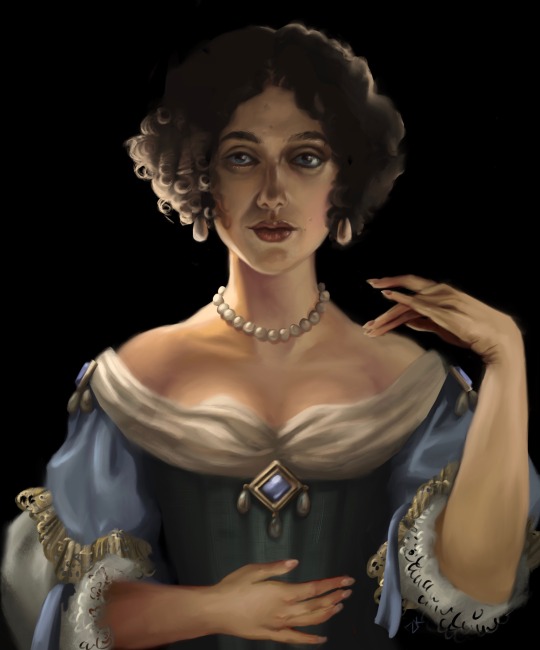
Portraits of her under the cut:
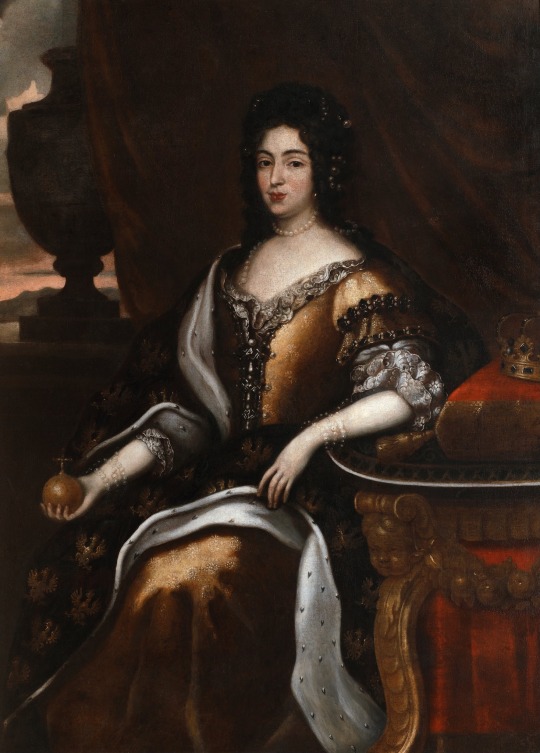
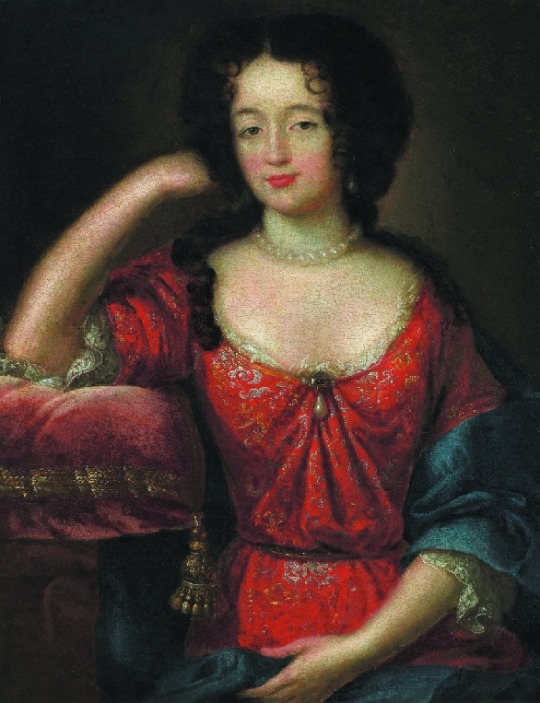

20 notes
·
View notes
Text
Sherlock is now a topic in Germany's final exam to get a high-school diploma.
It was an evening full of research until I found a former student who sold it to me 😊

18 notes
·
View notes
Photo
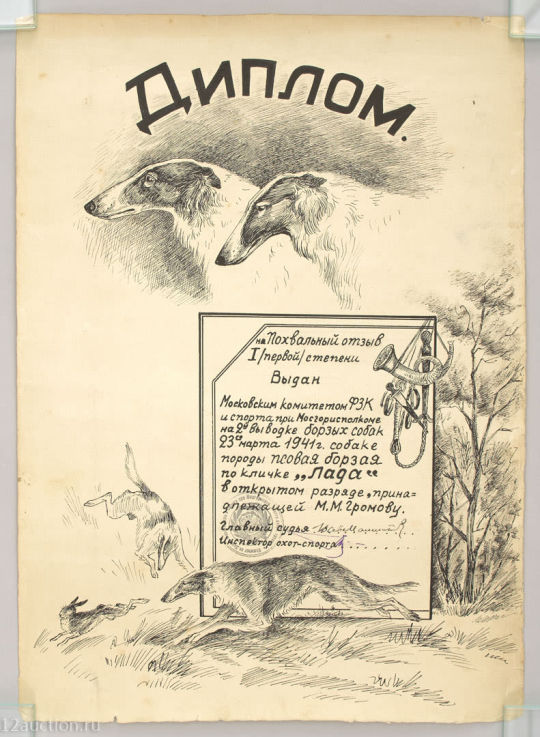
Pilot Gromov’s Borzoi Diploma for “Lada” (1941)
“Excerpt from the Judges’ Report” The Borzoi belonged to the pilot and military commander, General of Aviation of the Soviet Union Mikhail Mikhailovich Gromov (1899-1985)
24 notes
·
View notes
Text


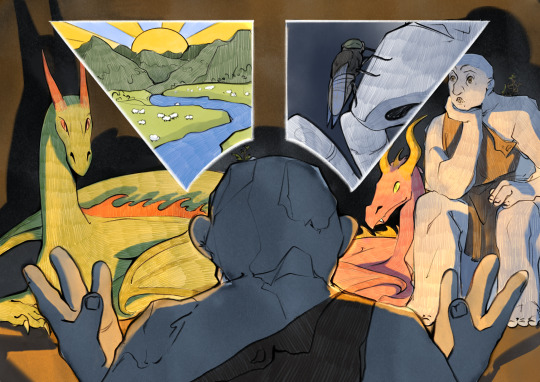
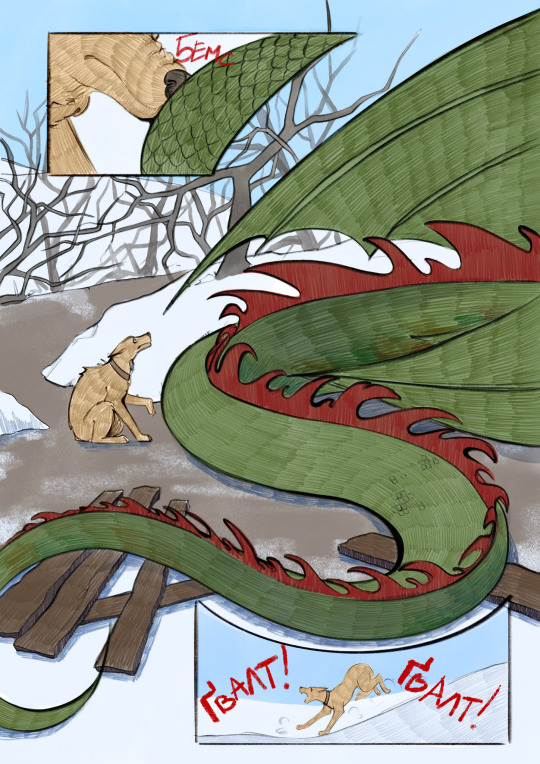

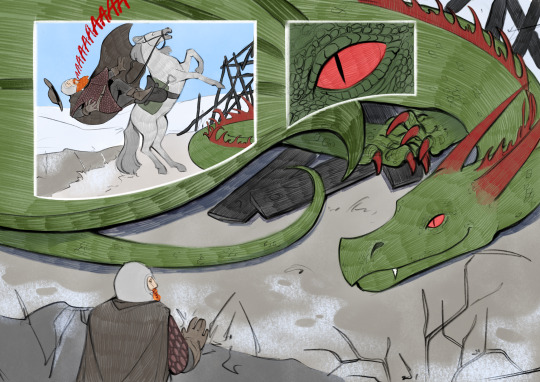



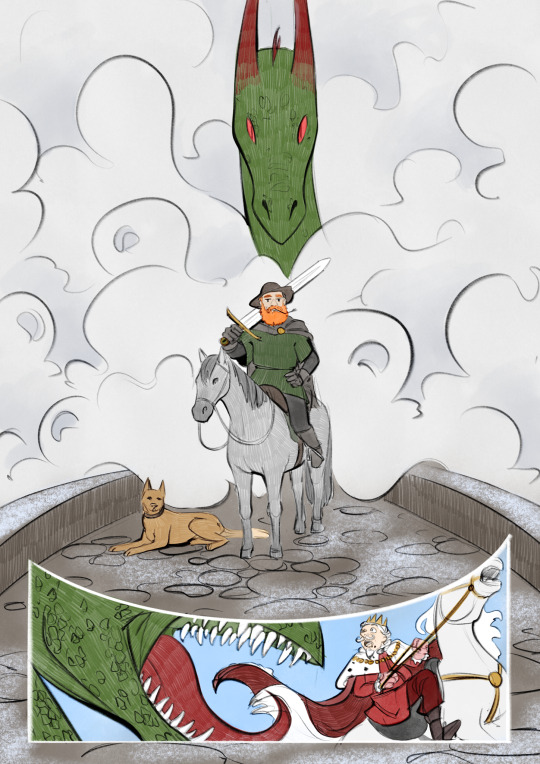
My diploma project
Illustrations of Tolkien’s novel “Farmer Giles of Ham”
153 notes
·
View notes